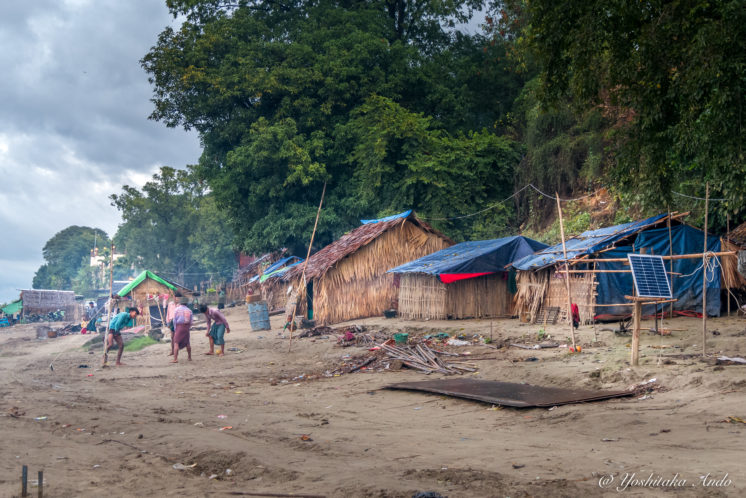The China International Trust and Investment Group Corporation (CITIC) is constructing the Kyaukphyu Special Economic Zone (SEZ) in Myanmar. The government was accused of unlawfully resettling locals for this project, exemplifying how corporations may benefit from state activities that violate human rights, while evading any accountability.
 Photo: Yoshitaka Ando / Flickr
Photo: Yoshitaka Ando / FlickrIn 2015, the Myanmar government chose CITIC as the winning bidder to develop the Kyaukphyu SEZ.[1] Over a 20-year period (2019-2030),[2] the CITIC Group will build an industrial park, two seaports to process cargo and a national highway to link the SEZ to the rest of Myanmar’s roads. [3]
The area housing the Kyaukphyu economic zone includes 35 villages with a population of 20,000 people. Most of the land in the area is classified as vacant, although the government is aware that farmers use the land through “customary land tenure”.[4]
Land acquired by the state in 2014 to construct water reservoirs supplying the SEZ area affected 26 farming families, who were promised compensation. The families affected by this land acquisition were not informed of the land confiscation until immediately prior to their forced displacement. Three years later, these families were still paying taxes on the land they no longer occupied and had not received any sort of remedy.[5]
In February 2016, the Myanmar government started the process to acquire land for the
SEZ itself.[6] It was feared that, if land acquisition took place in a similar fashion to 2014, the state would once again violate the residents’ rights to free and prior informed consent (FPIC) and there would be unlawful forced evictions.[7] As of 2019, questions still remain about the legality of the project including its governance arrangements.[8]
Myanmar has two other SEZs: Thilawa and Dawei, both of which have faced human rights issues regarding living standards and FPIC.[9] The International Commission of Jurists found that the SEZ law in Myanmar conflicted with international human rights laws and standards.[10] In 2017, a commission led by the former UN Secretary-General Kofi Annan recommended that more comprehensive assessments of potential adverse impacts should be carried out before continuing development of the SEZ. [11]
Since SEZs are government-sanctioned economic areas, companies may claim that they are not responsible for adverse human rights impacts. However, regardless of the state duty to protect human rights, according to the international normative framework, a company is responsible for conducting due diligence to ensure that human rights are not being violated in the course of their business operations, including during acquisition of the land on which they will be operating.
The risk of forced displacement to make way for Kyaukphyu SEZ could have been foreseen by CITIC, because similar problems had occurred with the development of earlier SEZs. Thus both the Myanmar government and CITIC seem to have failed to uphold their respective duties and responsibilities towards protecting and respecting the rights of villagers in and around the new SEZ.
[1] Aung Hla Tun and Timothy Mclaughlin, “China’s CITIC wins projects to develop Myanmar economic zone,” Reuters, December 31, 2015, https://www.reuters.com/article/myanmar-citic-project-idUSL3N14K1D720151231 (accessed November 5, 2019); Lindsay Skylar, “A Chinese Special Economic Zone is deepening conflict in Myanmar’s Rakhine State,” ASEAN Today, May 17, 2019, https://www.aseantoday.com/2019/05/a-chinese-special-economic-zone-is-deepening-conflict-in-myanmars-rakhine-state/ (accessed November 5, 2019).
[2] Nan Lwin, “Myanmar Signs 3 Agreements at Belt and Raod Forum”, https://www.irrawaddy.com/news/burma/myanmar-signs-3-agreements-belt-road-forum.html (accessed March 16, 2020)
[3] Nan Lwin, “In Myanmar, China’s BRI Projects Are Old Wine in a New Bottle”, https://www.irrawaddy.com/news/burma/in-myanmar-chinas-bri-projects-are-old-wine-in-a-new-bottle.html (accessed March 16, 2020)
[4] International Commission of Jurists, “Special Economic Zones in Myanmar and the State Duty to Protect Human Rights”, 51, Feburary 2017, https://www.icj.org/myanmar-amend-special-economic-zones-law-to-protect-human-rights-new-icj-report/ (accessed March 11, 2020)
[5] International Commission of Jurists, 55
[6] International Commission of Jurists, 57
[7] International Commission of Jurists, 72.
[8] Chau Thompson, “China-led port project inches ahead in Myanmar,” Asia Times, July 15, 2019, https://www.asiatimes.com/2019/07/article/china-led-port-project-inches-ahead-in-myanmar/ (accessed November 6, 2019).
[9] EarthRights International, “Special Economic Zones,” https://earthrights.org/what-we-do/land-rights/special-economic-zones/ (accessed November 6, 2019).
[10] International Commission of Jurists, 69-73.
[11] Vicky Bowman and Sean Bain, “Filling the gaps at Kyaukphyu,” Frontier Myanmar, Opinion section, May 30, 2017, https://frontiermyanmar.net/en/filling-the-gaps-at-kyaukphyu (accessed November 6, 2019); Advisory Commission on Rakhine State, “Towards a Peaceful, Fair and Prosperous Future for the People of Rakhine”, (Yangon: Advisory Commission on Rakhine State, 2017), 66., http://www.rakhinecommission.org/the-final-report/ (accessed November 6, 2019).
